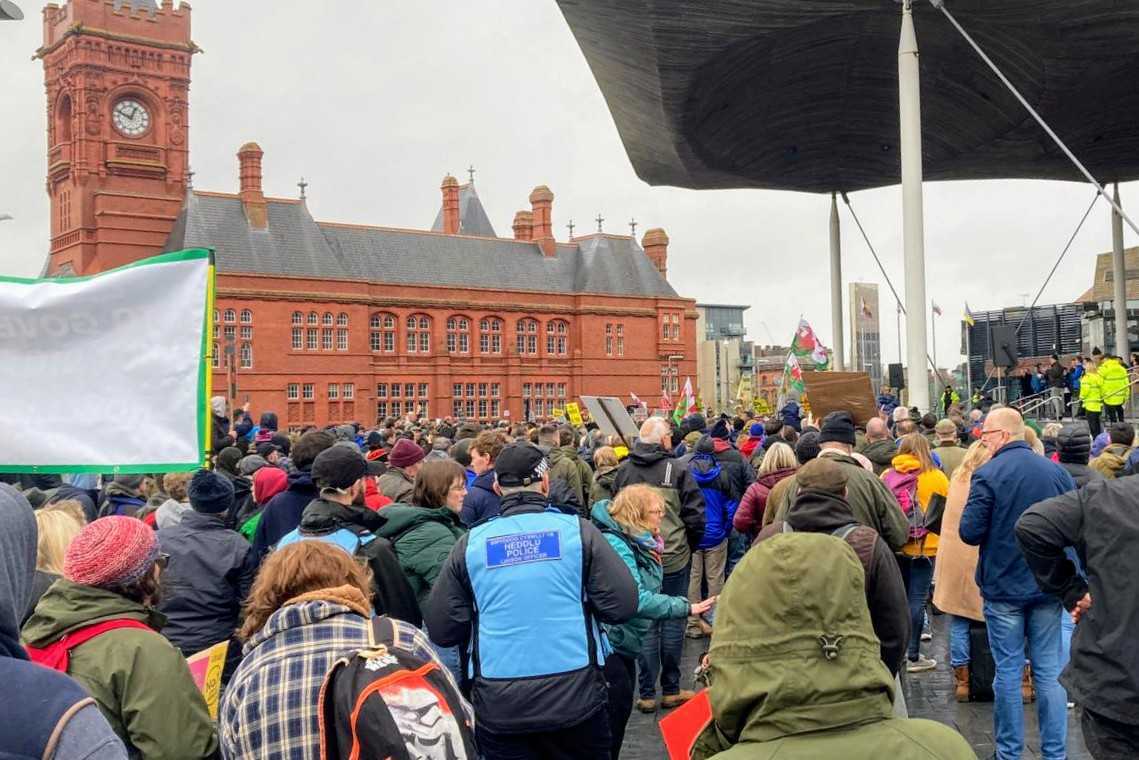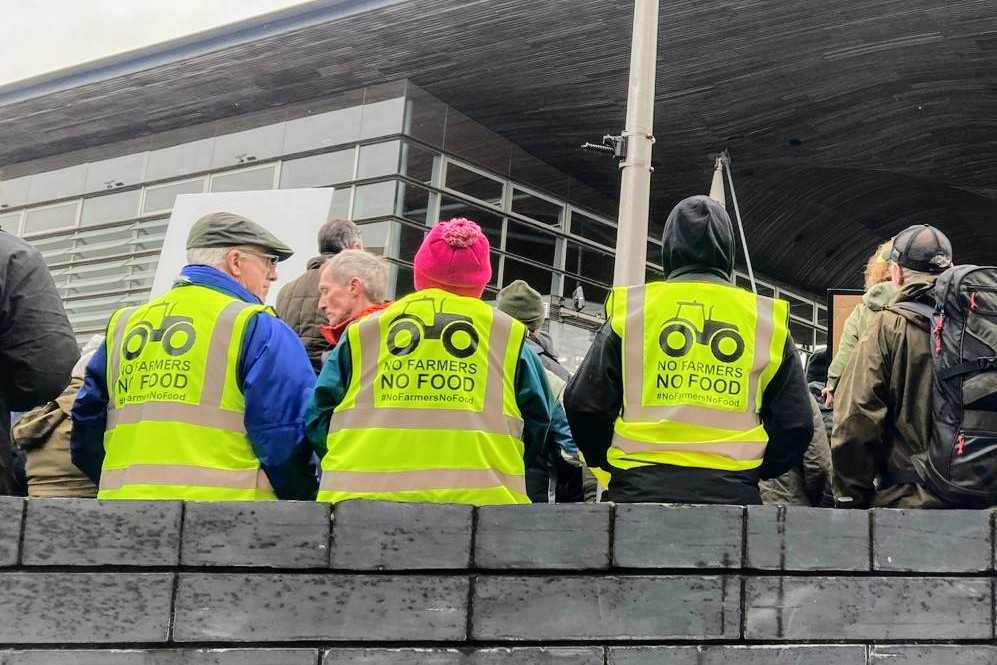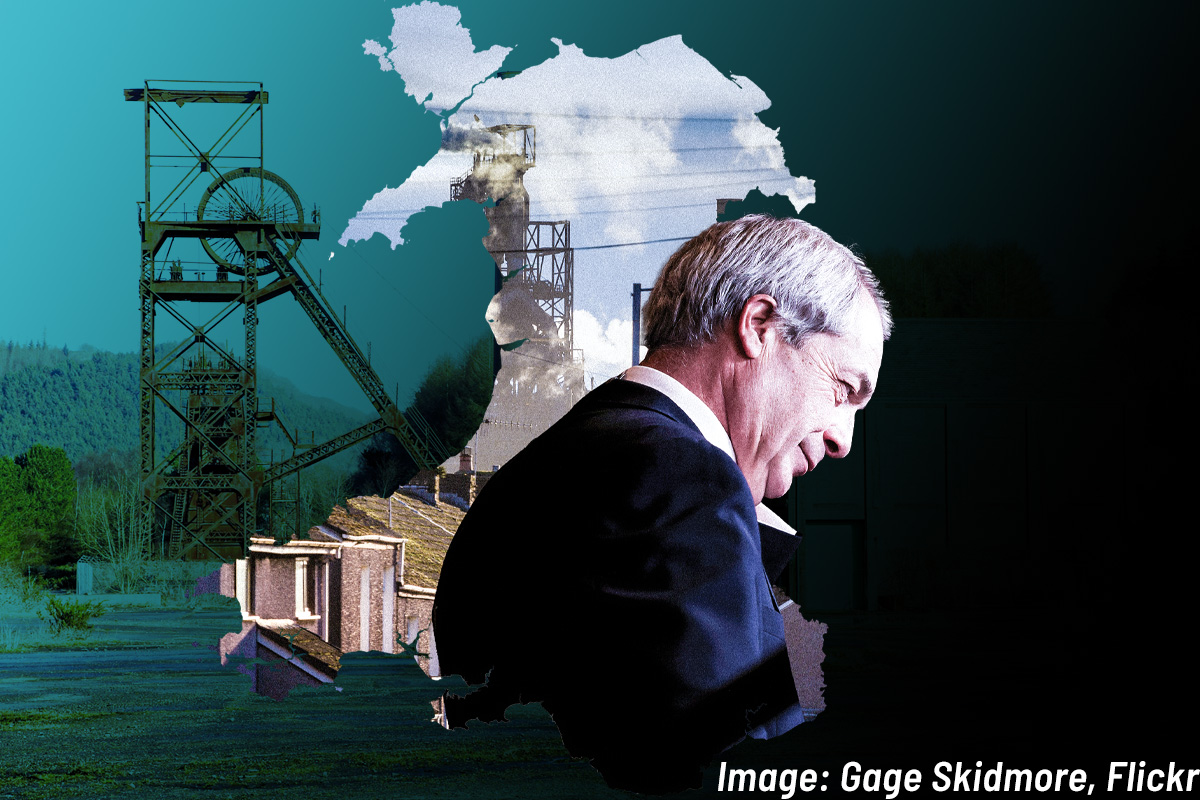The recent mass movement of farmers in Wales is unprecedented.
Inspired by similar farmers’ protests in France, Germany, and Poland, this movement began with a mass meeting in Welshpool, where over a thousand farmers met to discuss their grievances.
Following this, a similar meeting was organised in Carmarthen, with another massive turnout.
Like their European counterparts, Welsh farmers have also taken direct action to make themselves heard.

They have organised slow-downs across the M4 and in Swansea, using tractors to bring traffic to a halt. They have protested in Rhyl, in response to First Minister Mark Drakeford’s visit. And they have formed barricades around the office of Welsh rural affairs minister Lesley Griffiths in Wrexham, leading to one farmer being arrested.
Green austerity
The farmers are primarily fighting against three pieces of Welsh government policy relating to agriculture:
- Sustainable Farming Scheme (SFS): A proposal that requires farmers to use 10% of their land for tree-planting and another 10% for habitat creation.
- Nitrate Vulnerable Zone (NVZ) regulations: A policy that restricts the storage and spreading of manure and slurry.
- Bovine Tuberculosis (TB) policy: The ailing approach of the devolved government to combatting a devastating disease that affects livestock.
On the surface, these seem like commendable policies to tackle environmental crises. In fact, they are just further examples of ‘green austerity’ – attempts by politicians to make everyone but the big capitalists shoulder the costs of tackling environmental questions.
Tata and the Tories have peddled similar greenwashing recently, in order to justify the closure of steel production in Port Talbot.
In reality, all of these policies place all the burden on farmers, asking them to pay up, big time.
According to a study by the National Farmers’ Union (NFU), these policies could mean the loss of 5,500 agricultural jobs in Wales, alongside an 11% reduction in livestock numbers.
This would tip many small and middle farmers over the edge. Entire rural communities would be devastated.
Decades of difficulty
This mood hasn’t come from nowhere. The anger on display now has been long in the making.
Many farms in Wales are ‘Father & Son’ type small businesses. They often work seven-day weeks, and are up to their eyeballs in debt.
View this post on Instagram
The farmers are frustrated at how they are treated by the supermarkets and politicians, considering that 50% of the food we eat is produced domestically.
The mental health epidemic has also hit rural areas particularly hard. One farmer recently took his own life, after an inspection found that his sheep’s ear-tags were marked incorrectly.
This movement is therefore clearly the product of decades of difficulties and injustices finally bursting to the fore.
Reporting on the Welshpool meeting, Farmers’ Weekly stated: “There were grown men with tears in their eyes at the meeting…They are at the end of their tether. It is time for change.”.
Tory opportunism
Yesterday, on 28 February, South Wales Communists joined a protest organised by the farmers’ unions in Cardiff, attended by several thousand. It is significant that large numbers of these farmers were young.
The most militant speeches got the greatest responses. One said that the farmers’ struggle today is no different to the Great Miners’ Strike of 1984, or the ongoing Port Talbot steelworkers’ struggle. This got a huge applause.
There is clearly some conservatism from the tops. Farmers’ union leaders invited Plaid Cymru and Conservative politicians to speak, for example. This included Welsh Tory leader and arch-hypocrite Andrew RT Davies. Rishi Sunak has also opportunistically chimed in, sending the farmers a message of support from across the border.
Some farmers believe these gestures to be sincere. In reality, however, these are cynical and hypocritical moves from the Tories, driven by concerns about their collapsing support in English rural areas.
Notably, in response to the protests in Wales, Sunak has rushed to announce extra money for the farming sector in England. But where was this money before?
Against all the politicians
Many farmers don’t buy into this, however. Those at the protest stated that they didn’t come for a party political broadcast. The dominant mood is clearly against all these politicians.
One farmer from North Wales who bought our paper, for example, came up to The Communist stall on the basis of our slogan: No trust in capitalist politicians! Make the billionaires pay!

He said he hates all politicians, and wants to see what the communists have to say. Other farmers asked if we had placards with our slogan that they could take. Indeed, a fair few farmers approached us to talk, expressing support for our slogans.
The farmers’ unions, meanwhile, simply called for gentle protests, and for protestors to back politicians from any party who can represent the farmers on their behalf in the Senedd.
Unite and fight
This is clearly just the beginning. The Welsh Labour government will soon respond to the ongoing consultation regarding SFS. The response from Welsh politicians so far, however, has been arrogant at worst, and tone-deaf at best.
There is a danger of the farmers’ movement being taken over by right-wing demagogues seeking to derail it, or by politicians who’ll try to defang it. Both are on the fringes for now, with very little support. But they are trying their hand.
Ultimately, none of these figures or parties can address the root of the problem: the capitalist system, which squeezes everyone but the rich.
The Welsh farmers’ movement, and the boldness it has displayed so far, just like those in Europe, should serve as great inspiration for the working class in Wales and across Britain.
In particular, their militant action should inspire steelworkers in Port Talbot that a bold fightback is possible. A united mass movement of all these forces could go far.






